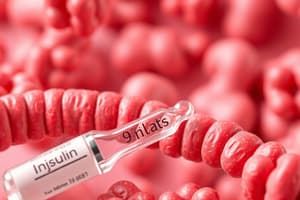Podcast
Questions and Answers
Which of the following processes is NOT directly increased by insulin?
Which of the following processes is NOT directly increased by insulin?
- Amino acid transport into cells
- Gluconeogenesis in the liver (correct)
- Glucose transport into adipose tissue
- Glycogen synthesis in the liver
Glucagon secretion results in which of the following changes in liver metabolism?
Glucagon secretion results in which of the following changes in liver metabolism?
- Increased glycogen breakdown and decreased gluconeogenesis
- Decreased glycogen breakdown and decreased gluconeogenesis
- Decreased glycogen breakdown and increased gluconeogenesis
- Increased glycogen breakdown and increased gluconeogenesis (correct)
How do catecholamines affect blood glucose levels during periods of stress?
How do catecholamines affect blood glucose levels during periods of stress?
- Increase blood glucose levels by promoting glycogenolysis and gluconeogenesis (correct)
- Increase blood glucose levels by inhibiting glucagon release
- Decrease blood glucose levels by promoting glucose uptake into cells
- Decrease blood glucose levels by promoting insulin release
Which hormone antagonizes the effects of insulin, leading to increased blood glucose levels?
Which hormone antagonizes the effects of insulin, leading to increased blood glucose levels?
Which of the following is NOT a potential cause of beta cell dysfunction in patients with diabetes?
Which of the following is NOT a potential cause of beta cell dysfunction in patients with diabetes?
What is the primary characteristic of type 1 diabetes mellitus?
What is the primary characteristic of type 1 diabetes mellitus?
In type 2 diabetes, what is the underlying issue related to insulin?
In type 2 diabetes, what is the underlying issue related to insulin?
What causes polyuria in uncontrolled diabetes mellitus?
What causes polyuria in uncontrolled diabetes mellitus?
A patient with uncontrolled diabetes mellitus experiences increased appetite. What is the physiological explanation for this symptom?
A patient with uncontrolled diabetes mellitus experiences increased appetite. What is the physiological explanation for this symptom?
Which of the following is the MOST important aspect of managing type 1 diabetes?
Which of the following is the MOST important aspect of managing type 1 diabetes?
What is the primary function of insulin in glucose metabolism?
What is the primary function of insulin in glucose metabolism?
In the context of diabetes mellitus, what does the term 'glucotoxicity' refer to?
In the context of diabetes mellitus, what does the term 'glucotoxicity' refer to?
What effect do glucocorticoids have on blood glucose levels?
What effect do glucocorticoids have on blood glucose levels?
How does glucagon affect protein metabolism in the liver?
How does glucagon affect protein metabolism in the liver?
Why might a patient with diabetes experience recurrent blurred vision?
Why might a patient with diabetes experience recurrent blurred vision?
Flashcards
Insulin Secretion Trigger
Insulin Secretion Trigger
Elevated blood glucose levels trigger insulin secretion, facilitating glucose transport into cells.
Glucagon Release
Glucagon Release
When blood glucose is too low, glucagon is released.
Insulin's Effect on Glucose
Insulin's Effect on Glucose
Increases glucose transport into skeletal muscle and adipose tissue; increases glycogen synthesis; decreases gluconeogenesis.
Glucagon's Effect on Glucose
Glucagon's Effect on Glucose
Signup and view all the flashcards
Insulin's Effect on Protein
Insulin's Effect on Protein
Signup and view all the flashcards
Glucagon's Effect on Protein
Glucagon's Effect on Protein
Signup and view all the flashcards
Catecholamines & Glucose
Catecholamines & Glucose
Signup and view all the flashcards
Glucocorticoids & Glucose
Glucocorticoids & Glucose
Signup and view all the flashcards
Growth Hormone & Glucose
Growth Hormone & Glucose
Signup and view all the flashcards
Diabetes Mellitus
Diabetes Mellitus
Signup and view all the flashcards
Type 1 Diabetes
Type 1 Diabetes
Signup and view all the flashcards
Type 2 Diabetes
Type 2 Diabetes
Signup and view all the flashcards
Polydipsia
Polydipsia
Signup and view all the flashcards
Polyuria
Polyuria
Signup and view all the flashcards
Polyphagia
Polyphagia
Signup and view all the flashcards
Study Notes
Insulin Secretion Control
- Triggered by elevated blood glucose levels, facilitating glucose transport into cells.
- Glucagon secretion decreases with elevated blood glucose, preventing excessive insulin release.
Actions of Insulin on Glucose
- Increases glucose transport into skeletal muscle and adipose tissue.
- Promotes glycogen synthesis.
- Decreases gluconeogenesis.
Actions of Glucagon on Glucose
- Promotes glycogen breakdown.
- Increases gluconeogenesis.
Actions of Insulin on Protein
- Enhances active transport of amino acids into cells.
- Increases protein synthesis.
- Decreases protein breakdown, improving glucose and fatty acid utilization as fuel.
Actions of Glucagon on Proteins
- Increases amino acid transport into hepatic cells.
- Increases breakdown of proteins into amino acids for gluconeogenesis.
- Increases conversion of amino acids into glucose precursors.
Other Hormones Affecting Blood Glucose
- Catecholamines (epinephrine and norepinephrine) from the adrenal cortex and locus coeruleus increase glucose levels, aiding maintenance during stress.
- Glucocorticoids increase glucose, critical for survival during fasting and starvation, and stimulate hepatic gluconeogenesis.
- Growth hormone increases glucose, promotes protein synthesis, mobilizes fatty acids from adipose tissue, and antagonizes insulin effects.
Diabetes Mellitus
- A metabolic disorder affecting carbohydrate, protein, and fat metabolism.
- Results from an imbalance between insulin availability and need.
- Body cells may not respond to insulin or there may be insufficient insulin production.
- Cells are starved for fuel, leading to alternative fuel sources.
Potential Representations of Diabetes
- Absolute insulin deficiency.
- Impaired insulin release.
- Inadequate or defective insulin receptors.
- Production of inactive or destroyed insulin.
Causes of Beta Cell Dysfunction in Diabetes
- Initial decrease in beta cell mass.
- Decreased insulin production.
- Increased beta cell apoptosis or decreased regeneration.
- Long-standing insulin resistance leading to beta cell exhaustion.
- Chronic hyperglycemia (glucotoxicity) can induce beta cell desensitization.
- Chronic elevation of free fatty acids (lipotoxicity) can cause toxicity to beta cells.
- Amyloid deposition in beta cells can cause dysfunction.
Types of Diabetes
- Type 1 involves loss of beta cell function, resulting in an absolute insulin deficiency requiring lifelong insulin administration.
- Causes are often unknown, autoimmune destruction of beta cells is likely.
- Typically diagnosed from childhood to early adulthood.
- Type 2 involves impaired ability of tissues to use insulin, a relative lack of insulin, or impaired insulin release relative to blood glucose levels.
- Increasingly diagnosed in children due to obesity.
"Sweet Diabetes" (Three Polys)
- Polydipsia: Increased thirst due to high blood glucose levels.
- Polyuria: Increased urine output via osmotic diuresis as kidneys struggle with high glucose levels, pulling water toward glucose.
- Polyphagia: Increased appetite due to body cells being starved for fuel.
Diabetes Symptoms
- Abrupt weight loss.
- Fatigue.
- Paresthesias.
- Recurrent blurred vision.
- Easy injury.
- Skin infections.
Type 1 Diabetes Management
- Nutrition therapy.
- Exercise/weight control.
- Glucose monitoring (frequent, at least 4x/day, before meals and at bedtime - ACHS).
- Healthcare provider follow-up.
- Insulin/insulin pump/pancreatic transplant.
- Includes short-acting, intermediate-acting, and long-acting options.
Studying That Suits You
Use AI to generate personalized quizzes and flashcards to suit your learning preferences.




